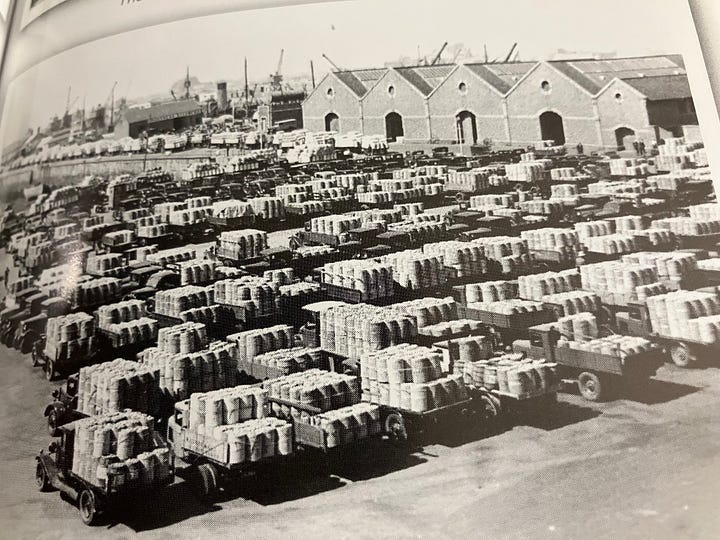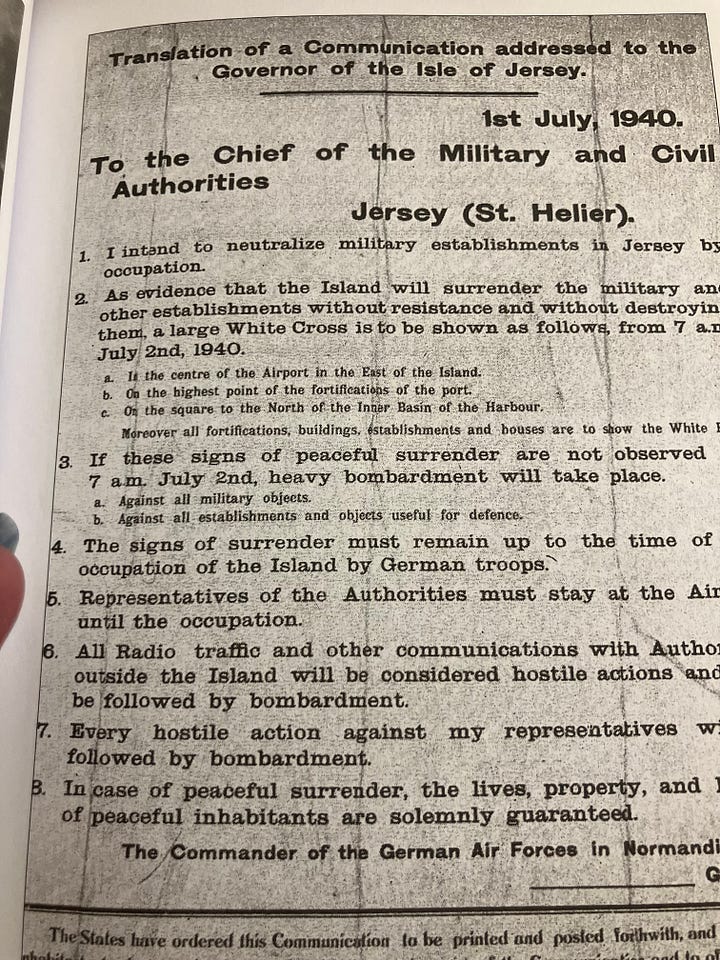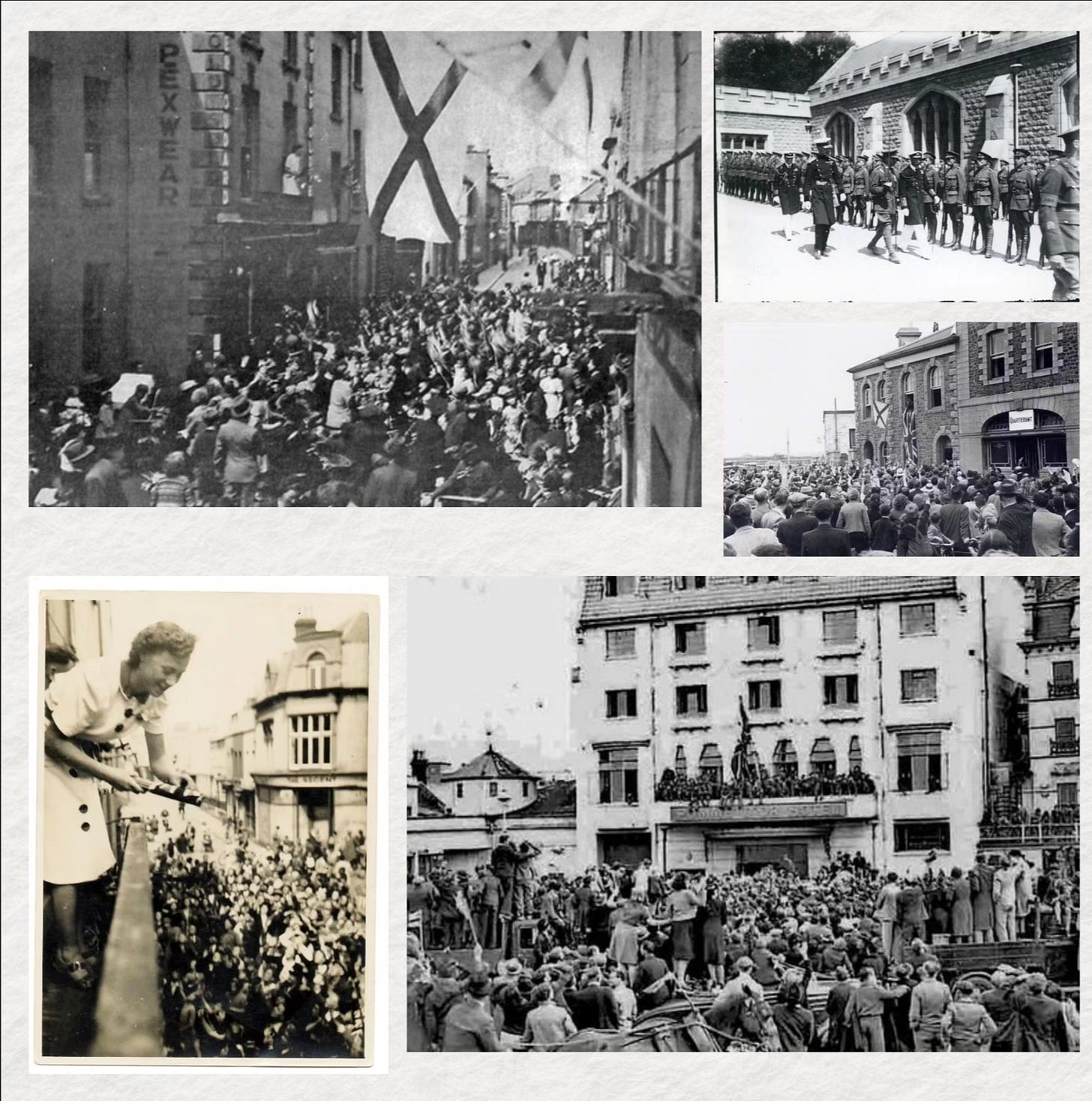Happy Liberation Day, Jersey!
The first in a short series charting the progress of my family through the German Occupation of Jersey, 1940-45.
Jersey Evening Post
HONOURING 80 YEARS OF LIBERATION DAY 9 May 2025
I was watching the TV celebrations on VE Day and when film of King George the sixth started with his liberation message, I thought, aha, this is where he mentions ‘Our dear Channel Islands’ being made free the following day. But in the whole two hours 10 minutes of the show, there was no acknowledgement of the privations Channel Islanders suffered under the German occupation, which I find strange because the islands were the only part of Britain that was invaded in WW2, when they were abandoned by the British government. So yesterday, 9thMay, was Jersey’s Liberation day, the day my grandparents and three aunties welcomed the British sailors and soldiers who came to liberate them in what is now renamed Liberation Square but was then the Weybridge, where the potatoes and tomatoes being exported were weighed before being loaded onto freighters bound for England.
In 1939 when World War II started, Jersey was considered a safe haven for holidays, and the British, looking for an escape from the doom and gloom of war, headed for its beaches. As the war in Europe raged, Paris fell and the fighting came closer to the Cherbourg Peninsula. Islanders could hear the guns on the French coast and became frightened at the proximity of the German army. Will it be us next? The King and Winston Churchill reassured them by insisting that no harm would come to the islands and they would be defended. They sent troops over to create defences around the coastline. But after a week or so the British government had a change of policy, decided that the islands were of no strategic importance and they couldn’t spare the troops to defend them. The islands were declared a demilitarised zone (DMZ) and left to German invasion, but Britain did extend a lifeline to residents. They sent boats to evacuate all who wanted to go to England and hundreds of islanders signed up to go.
My great aunt Blanche was one of them. She was terrified that there might be an invasion, so with her brother John, who said he would have preferred to stay and take his chances, got tickets to sail on the 29th of June 1940. However, there was one snag. They had a dog they both doted on and treated as a child. Togo was a beautiful Welsh collie who ate at table with them and slept in my aunt’s bedroom. Blanche insisted on taking her on the boat and refused to leave without her. Animals were not allowed on the boats so livestock and pets were being abandoned all over the island as people escaped. Blanche and John were turned away at the harbour with Togo. No one else, especially my grandfather (who disliked his brother and sister in-law), would have the dog. Blanche was still petrified and wanted to leave. So that night John, doing the only thing he could think of, shot Togo. Blanche was devastated, but tearfully got ready to leave.
Unbeknowns to anyone, the German High Command had not been told that the British army had quit the island and declared it a DMZ. So German intelligence mistook potato lorries at the Weybridge for gun carriages and sent bombers to bomb both the main islands, killing 10 farmworkers and injuring dozens more who were queuing with the lorries at the Weighbridge. Guernsey had a higher casualty rate. The morning after John’s shooting and as they were getting ready to leave, the BBC News stated that, as the invasion was imminent no more boats could be sent to the Island and the evacuations would cease immediately. There was no escape for Blanche.


The invasion took place the following day. Hundreds of troops arrived by air and sea over the next few days. Representatives of the Jersey government greeted them at the airport and were left in no doubt as to who was in charge. These were bewildering and frightening days - food was already rationed but with hundreds of German troops arriving it would become more difficult to feed the population. Worse was to come for islanders over the five long years of occupation. Next month I’ll tell you some more of my family stories, how they coped with, or got round the restrictions, carried out small acts of resistance and had surprising and in some cases, very unwelcome situations visited upon them.


I made a short film to tell Blanche’s story. It can be found here.
Thanks for reading or listening and look forward to seeing you here next month.
As a footnote, years later it was disclosed by Britain that they had omitted to tell Germany that the islands were undefended and been declared a DMZ, which was why the German bombers were sent to the islands. The workers had died unnecessarily.
§§§§§§§§§§§§§§§§§§§§§
This month I read
The Revels by Stacey Thomas. I haven't read much (anything) on witchcraft in England, although I knew of the Salem witches through ‘The Crucible’ Arthur Miller’s play. In 1645 an illegitimate son who inherits when his half brother dies fighting for the Royalists, becomes an apprentice to a reluctant witch finder and the full horror of the accusations becomes evident. That's the story. If you like reading the era and the subject it's a good book. This novel, the author's debut, is intensely written and well constructed, but unremittingly bleak. I found it very depressing, and I don't think I will be exploring the subject again.
I listened on Audio to
I am Not Sidney Poitier by Percival Everett. A baby is born in Los Angeles who looks like Sidney Poitier and whose quirky mother decides to christen him ‘Notsidney’. That leads to a lifetime of misunderstanding and confusion. This is another of Everett’s odysseys that reminded me of the film ‘Oh Brother, Where art Thou’, a gloriously silly story with serious overtones, not just white supremacy, but also prejudice associated with shades of brown. Everett has even put a version of himself into the story. I love his writing and the narrator was an ideal choice.
I watched
This City is Ours TV series on BBC1 and Iplayer. This is a quality crime drama series about a family who have been dubbed the Scouse Sopranos. It’s a thrilling watch but if you don’t speak Scouse, put the subtitles on! Series one has just finished with lots of cliff-hangers, and there’s to be a series two next year - hooray!






I loved reading this Sue. This is history that we all should know about x
A story that needs telling during these challenging times so we never forget! Thank you, Sue! 🙏